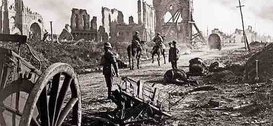Share this page
Silence - An American Tragedy
Polska Canada
July 13, 2020
The statue of Silence, a remarkable work of art sculpted in the 1870s by Robert Reid of the Montreal Marble Works, was recently desecrated in Savannah’s beautiful and historic Laurel Grove Cemetery. It was a shameful act, done at night without courage or, thus far, consequence. It saddened me beyond words; it broke my heart. I know from history that the burning of books and the destruction of statues are a prelude to violence and nihilism. It marks the end of order.
Click on link below to access article:
https://www.polskacanada.com/barry-sheehy-silence-an-american-tragedy
"Freedom is Never Free" - Sheehy brothers and
families travel to Normandy to celebrate the "brave Poles"
OTWARTYM TEKSTEM Interview with Canadians Barry and Matt Sheehy
Ewa Stankiewicz in TV Republika on October 5/2018
Click on link below to access YouTube video:
The Winged Alliance - Canadian Journey to Honor Poland
Polska Canada
January 23, 2019
Visual record of journey to Poland of three Canadian brothers - Captain Barry Sheehy, Captain Matt Sheehy, and Paul Sheehy - to lay wreaths at several war monuments in Warsaw in honor of WW II Polish soldiers
Click on link below to access article:
http://www.polskacanada.com/the-winged-alliance-canadian-journey-to-honour-poland
Honoring the past and present alliance between Canada and Poland
A meeting among Captain Barry Sheehy, Captain Matt Sheehy and Jaroslaw Szarek, the President of the Institute of National Remembrance.
Click on link below to access Twitter message:
Civil War Savannah: St. Vincent's Academy
American History TV, C-SPAN3
Author Barry Sheehy
Savannah, Immortal City
Click on link below to access YouTube video:
Civil War Savannah: Candler Hospital and POW Camp
American History TV, C-SPAN3
Author Barry Sheehy
Savannah, Immortal City
Click on link below to access YouTube video:
https://www.youtube.com/watch?v=c4ryIkBD5KI
Double-click here to add your own text.
Polish Online Magazine Polksa Canada reprints Sheehy Article
Avro Arrow CF 105, Number 201
Canada's principle online Polish Magazine, Polksa Canada, reprints Sheehy's article "No Greater Allies - The Poles and Canada." (Original article listed under Recent Articles tab.)
Click on the link below to access the story.
http://www.polskacanada.com/barry-sheehy-no-greater-allies/
Montreal: City of Secrets, Favorably Reviewed by French Newspaper
Author Barry Sheehy's new book, Montreal: City of Secrets, was favorably reviewed by Le Devoir, Canada's leading French newspaper.
Le Devoir has been publishing since 1910. Based in Montreal, Le Devoir distributes nationally in Canada. It is an important journal in its own right and very influential in the general as well as the francophone communities.
Click on the link below to access the review:
http://www.ledevoir.com/culture/livres/505702/montreal-la-sudiste-du-nord
Who's flying the plane?
Pilots used to be in command of their airliners, but automation is taking over and we are seeing the results.
Commentary by Barry and Matt Sheehy
http://windsorstar.com/opinion/guest-column-whos-flying-the-plane
CBC/Radio Canada Interview
Barry Sheehy - Sydney Port Development
Why is it that some people think a container port in Sydney Harbour is a "pie in the sky" dream, while others see Sydney as being one of the great centers of port development in the next decade? Barry Sheehy is a consultant for the Cape Breton Regional Municipality.
To access the March 10, 2015 interview conducted by CBC/Radio-Canada entitled “Barry Sheehy – Sydney Port Development,” refer to the following link.
http://www.cbc.ca/player/AudioMobile/Mainstreet%2BCape%2BBreton/ID/2658258145/
(Tip: Click on the above link or copy and paste the above link into your browser address box.)
Barry Sheehy discusses the opportunity for development at Port of Sydney
“Newton’s third law: for every force there is an equal counterforce generated in nature”
The Tide Turns on Woke
Posted September 20, 2023
Atlantic Canada
Cancel culture, ESG, and CRT cannot succeed because they are divisive, racist, and deny the pursuit of excellence and promotion of meritocracy. No society that turns its back on excellence and meritocracy has ever succeeded. Just ask the Soviet Union. This whole crazy experiment is doomed to failure. Shareholders are already balking at ESG investment strategies. It is only woke, super-large investment houses that are keeping this afloat. They are the oligarchs of today. At the end of the 19th century, it was railroad and transportation trusts that dominated the economy. Teddy Roosevelt broke them up with new antitrust laws. These same laws are still on the books and should be used again. It is time for a reckoning.
Companies that drifted into the woke agenda are waking up to the damage caused by an ideology rooted in grievance and division
Companies that drifted into the woke agenda are waking up to the cultural and institutional damage caused by an ideology rooted in grievance and division. Organizations are becoming slower, more brittle, more risk averse, and sluggish in responding to both danger and opportunity. And no wonder, given the corrosive nature of these ideas. No one with a lick of common sense believes this nonsense, yet we remain muted. The time to push back and speak up has come.
As the woke agenda fails and the world enters a period of slower growth, or perhaps worse, a new crisis will emerge. The burning question for leaders will be “How do you restore the soundness of your company, your institution, and your economy? How do you cleanse yourself of these self-destructive values and practices?” It will amount to a massive detox exercise.
This new agenda is not about abandoning progressive ideas but about challenging them. Do they make sense? Do they make organizations stronger and more cohesive, or do they have the opposite effect? The key to digging ourselves out of this mess is to reorient ourselves around the customer and the shareholder, but especially the customer.
Quality Improvement revolution. Focus on the customer and deliver value, and you will prosper
Leaders must stop allowing one narrow constituency after another to capture precious corporate resources when, in the end, it is only the customer that matters. When the customer's needs are met, shareholder needs will be met, employee needs are best met, and so will the needs of society.
This brings us back to antecedents of the Quality Improvement revolution. Focus on the customer and deliver value, and you will prosper. It is not all that complicated. But if the focus instead is on racism or reverse racism, grievance, division, pronouns, and micro-aggressions, it must and will corrode your institution. This ideology infects whatever it touches and too many CEOs have been content to go along to get along. But the tide is turning, albeit slowly, but inevitably. Public institutions, lacking the discipline of a bottom line, are particularly vulnerable to this infection. Many of our universities may already be beyond redemption. They have become intellectual wastelands where healthy debate and skepticism have been crushed. Private companies with shareholders and a bottom line will adapt first…or die. And make no mistake, some will choose to perish rather than admit to an error this gross. This explains why so few Fortune 500 companies last more than one or two generations.
Getting into the Mess
Hubris born of post-war economic dominance allowed America to take its eye off the customer by the 1970s in favor of planned obsolesce, profits over investment, and the indulgence of powerful unions. This brought on the “quality crisis” of the 1980s where customers avoided cars built on a Monday or Friday. Do remember the bumper sticker “Another Rusty Ford.” It appeared for a time that Japan would eat America’s lunch. But it did not happen. Why? Because America returned its attention to the customer and clawed its way back into a number one position in global competitiveness. It was a stunning comeback. There is a famous Time Magazine cover from the early 1990s which featured a sharpened pencil against the backdrop of the US flag with the header “Who’s sharper now?” The headline says it all. America can indeed dig itself into holes but is damn good at reversing course and digging its way out when new thinking is required. The flexibility, creativity and resilience of the US economy remains astounding.
But history does have a way of repeating itself. Today, corporate America is once again taking its eye off the customer in pursuit of divisive notions of equity, inclusion, and reverse racism. Perhaps a decade of free money based on near-zero interest rates enabled companies to become unhinged from reality. The same can happen to people. In a world of near-free money, a lot of loony ideas can be floated, at least for a time.
Who will lead this counter revolution? Who will be ahead of the learning curve? Who will push the envelope of change?
In a world of free money and unlimited federal deficits, a lot of silly, non-productive, downright crazy things can be funded. Ask yourself how many DEI managers or vice presidents does a university need? Too many apparently, as they are starting to outnumber faculty. Rich endowments may allow this nonsense to carry on for a time, but the handwriting is on the wall. Universities exist to serve the needs of customers (students and parents) and the community, and they are built around the scholarship of the faculty—that is the product. This legacy can be traced back to the Sorbonne, Bologna, and Oxford. If a university fails at this mission, it has no God-given right to perpetual existence. If the Roman Empire can go out of business, so can Rutgers University.
As interest rates rise and the economy slows, the folly of all this will become clearer and clearer. Companies with sound, prescient leadership will want to move away from destructive policies and strategies and return their focus to the customer. This is the fulcrum point for leveraging change. As Archimedes proclaimed, “give me a lever long enough and a fulcrum strong enough, and I can move the world.”
This is the next big thing. Who will lead this counter revolution? Who will be ahead f the learning curve? Who will push the envelope of change...a change America desperately needs now?
The Death of the Dollar-More Suicide than Murder
Posted September 6, 2023
Atlantic Canada
Drinkin' rum and Coca-Cola…
Both mother and daughter
Workin' for the Yankee dollar.
--Andrews Sisters hit song 1944--Rum and Coca-Cola
When the Andrews Sisters recorded this famous song in 1944 the US was on the verge of winning the Second War in league with a host of allies including China, Russia and 24 other nations including Canada. US industry had begun gearing up for war in 1941 and reached a fever pitch by 1944. By then, the US was launching a ship a day. The US began the war with four aircraft carriers and ended it with over 100 (all classes).
The US had an almost limitless capacity to produce wheeled, armored vehicles and aircraft. This output was so prolific that the government began throttling back production as early as 1944, a year before the war ended. They could already foresee dumping millions of rounds of ammunition into the ocean, mothballing whole fleets, storing aircraft in the desert
The following year when the war ended, most of the world’s productive capacity in Asia and Europe had been destroyed. The US emerged unscathed and accounted for almost half the world’s manufacturing output. This apex was transitory as Asia and Europe would inevitably build back their industrial base. The US funded this rebuilding through the Marshall Plan and other financial mechanisms. Much of this money went to rebuilding the economies of former enemies. This was one of the great acts of enlightened self-interest in history.
US led the way in restoring a stable monetary system
With the world struggling to recover from the most destructive war ever, the US led the way in restoring a stable monetary system. At Bretton Woods in 1944, the US convened a conference where the future stability of the global monetary system was laid out, based on US dollars as the world’s reserve currency. Bretton Woods established the institutions that governed the world financial system for the next 75 years, including the International Monetary Fund (IMF), the World Bank, and the International Bank for Reconstruction and Development. This dollar-denominated global monetary system underpinned the Pax Americana which endured well into the 21st century.
Today the end of US dominance in the global monetary system is on the horizon and this will have profound implications for business and personal finances. No one will be untouched. The dethroning of the dollar after 75 years of primacy will not happen overnight but it will happen. The arrival of BRICS (Brazil, Russia, South Africa, India and China), soon to be joined by 40 other countries, will change our world. The new BRICS currency, backed by gold and commodities including oil, will be attractive. If they can pull it off, this will emerge as a powerful reserve currency with its own exchange mechanism.
The end of Bretton Woods and the US dollar as the world’s prime reserve currency
This will mark the end of Bretton Woods and the US dollar as the world’s prime reserve currency. As the US dollar becomes less needed to lubricate trade and international settlements, excess dollars will come flooding back to the US creating inflation. US assets will become targets for takeover and America’s capacity to run deficits will shrink.
How and why did it happen?
There are iron rules associated with being the world’s reserve currency. These include not overspending, protecting the inherent value of the currency, and not politicizing the mechanisms underpinning the global financial system.
Protected by its Reserve Currency status and outright hubris, the US broke all these rules, especially in the last 20 years.
US deficits are out of control and this will lead to a terrible day of reckoning. These bills must ultimately be paid. Runaway deficits depreciate currency, putting at risk everyone holding US dollars, including the American People. Over-spending by government fuels inflation, always and everywhere, and this is what we are experiencing now. Each day the buying power of the dollar shrinks. Sooner or later, foreigners will look to hedge against this depreciation and that means dumping dollars for other currencies or commodities.
The US has also broken the third rule of a reserve currency “don’t politicize your monetary system”
Part of the US deficit problem is that America funded the defense of North America, Europe, much of the Middle East, and parts of Asia. Many of these protected allies are rich and yet remain unwilling to fund their own defense and this includes Canada. Meanwhile, the US taxpayer is picking up the bill, which means less capital available for infrastructure, education, productivity-boosting technology and investment.
The US has also broken the third rule of a reserve currency “don’t politicize your monetary system” and here considerable damage has been done. In recent years, the US has abused its reserve currency status time and again to impose political consequences on enemies and friends alike. Every time a nation is subject to sanctions or denied access to the SWIFT (Society for Worldwide Interbank Financial Telecommunications) such as Russia recently, this means they cannot employ their dollars to do business. If they cannot use their dollars, then why hold them?
US smashed the centuries old ultra confidential Swiss banking system and did so with utter indifference to the collateral damage
It is not only Russia that has been bullied by US monetary authorities. Allies have also felt also felt the sting of the lash. The Swiss banking system, quiet, confidential and secure for two hundred years, came under US assault. To expose US tax cheats, the US smashed the centuries old ultra confidential Swiss banking system and did so with utter indifference to the collateral damage. These same tactics and threats have been applied to many allies over the years and they are fed up. You cannot open and close access to the global monetary system on a whim and expect people to trust it.
No wonder so many nations are looking for an alternative in BRICS. Saudi Arabia has long been a bulwark for the US dollar as the only means of buying Saudi oil. This provided a powerful wall in defense of the US dollar as a reserve currency. The fact that Saudi Arabia is moving away from the dollar as a means of purchasing oil should have everyone in Washington running around with their hair on fire. That everyone seems to be treating this with a yawn is astonishing. Maybe Euripides was right when he wrote “whom the gods would destroy, they first make mad.”
Barry Sheehy
"Seize that opportunity:" Sydney businessman says focus
on offshore wind is the sensible move.
Posted June 2, 2023
Atlantic Canada
Ian Nathanson
SYDNEY, N.S. — Barry Sheehy believes Novaporte’s move away from its focus on a container terminal and more toward offshore wind energy makes more sense.
“We’re on our way,” said Sheehy, an author, historian, veteran and businessman involved with Sydney Harbour Investment Partners (SHIP) and Novaporte, the transportation, logistics and green energy development group headed up by chief executive Albert Barbusci.
“The energy is high. We got the right partners; we have the leadership support from the First Nations.
“There were forces that seemed to be against us for a while, but we were able to overcome them.”
Sheehy, making an appearance at the Port Days conference on Thursday at the Joan Harriss Cruise Pavilion’s Pittman Hall, said the container terminal project is still in Novaporte’s future plans. The firm had a years-old exclusivity agreement with the Cape Breton Regional Municipality to market port development on a piece of municipal-owned land near Sydport.
Click on link below or insert it into your browser to view full article.
https://www.saltwire.com/atlantic-canada/business/seize-that-opportunity-sydney-businessman-says-focus-on-offshore-wind-the-sensible-move-100859869
Forget 1939; Think 1914
Canada Free Press
April 11, 2023|
One of the factors contributing to the utter failure of diplomacy in 1914 was the decay of previously functioning institutions in foreign and military affairs. The diplomatic regime that governed Europe from 1870 to 1914 had begun to unravel in the years leading up to World War One. These institutions had avoided a clash between great powers for half a century. There had been some near misses but, in the end, level heads prevailed, and tragedy was averted. This reliance on successful diplomacy bred a degree of complacency, even hubris, among Europe’s governing elites. Countries grew dangerously unafraid of war.
Consider the similarities to today. Institutions like NATO, the EU, and dollar-denominated world financial system have all been decaying since the end of the cold war. European countries (and Canada) have refused to meet their commitments to spend 2% of GDP on defense preferring to let the Americans do the heavy lifting. As a result, NATO has been hollowed out. Ammunition stockpiles are so thin that the transfer of munitions to Ukraine drained them completely. The industrial base needed to replace these munitions no longer exists and so restocking will be a long, uneven process. NATO has become essentially an American protectorate. This allows NATO members to spend lavishly on social programs while US taxpayers pay the defense bill. This cannot last because the ability of the United States to print money endlessly is coming to an end.
Meanwhile the EU, which was born as a common market to curb Europe’s propensity to murder each other in endless wars, has evolved into a bloated, overbearing monster that seeks to interfere in every aspect of national life. This has forced the UK out of the EU and resulted in small insurgencies in the Netherlands, Belgium, and France. Other sovereign nations such as Poland and Hungary are increasingly resistant to dictates from Brussels. The Euro is in trouble because a monetary union without a fiscal union regime cannot work, as Margaret Thatcher predicted. Spendthrift countries splurge while responsible economies (read Germany) sop up the excess. As retirement age in Greece is being lowered it is being raised in Germany to pay for it. How long the Germans will put up with this is unclear but Like NATO’s imbalance, it is unsustainable. The European Central Bank has serious problems with its balance sheet and a sovereign debt crisis may not be far off.
A military loss in Ukraine (i.e., the Russians stay put) could push both NATO and the EU to the brink. Once the finger pointing starts, cohesion will bleed out of these institutions.
At the same time the post-war pax Americana and unipolar world are fast unwinding. While US attention is focused on Ukraine, its standing in the world, diplomatically and financially, is eroding. In fact, the speed of this unravelling is breathtaking and reflects monumentally inept leadership. Just in the past two years BRICS (Brazil, Russia, China, India, South Africa) have made remarkable progress in creating an alternative to the world’s dollar-denominated financial system. Other countries are now looking to join BRICS. In an astonishing move, Saudi Arabia has abandoned the petrodollar and will now sell energy for rubles, rupees and yuan. This is a catastrophe for the United States currency. As the world loses its appetite for dollars, American capacity to print money endlessly will erode and interest rates will rise. There are serious consequences to being dethroned as the world’s prime reserve currency.
As a coup de grace, Brazil, the largest country in South America, has slipped into the hands of a convicted criminal and friend of China following a disputed election. The Brazilian Army has the constitutional authority to intervene in such a situation but was waved off by the US State Department. The question “who lost Brazil” will become a hot topic in the years ahead.
Closer to home, Canadians have lost confidence in their much-vaunted health care system and trust is fast bleeding out of our public heath institutions. As the COVID narrative painfully collapses in the years ahead, this erosion of trust will only accelerate. Meanwhile, in defense of their energy and agriculture industries, Alberta and Saskatchewan have passed Sovereignty and Saskatchewan First Acts. If Ottawa continues to push these western provinces into a corner, these initial fractures could evolve into major fault lines in Canada. Consider what Canada’s GDP looks like without these provinces. And what happens to annual transfer payments to Quebec and the Maritimes without this money? And what happens to Canada without transfer payments? So why doesn’t Ottawa back off and do the classic Canadian thing: “muddle through.” Because this is not about economics or politics, it is about ideology and when was the last time you saw an ideologue compromise?
Thus, we see institutions that dominated our world since the end of the Second World War eroding and collapsing. What will replace them is unclear, but the journey ahead will be treacherous. And don’t count on cooler heads to save us. Look at the world stage, where do you see cooler heads in the ascendance?
Forget comparisons to 1939, today’s world looks a lot more like 1914.
Barry Sheehy
An accomplished speaker and author, Mr. Sheehy‘s works have appeared along side of those of Presidents Clinton and Bush, Alan Greenspan, Robert Rubin and business leaders such as Lou Gerstner, Jack Welch, and Michael Dell, Edwards Deming, Stephen R. Covey, Rosabeth Moss Kanter, Gary Hamel, Peter Senge and Tom Peters. His speaking tours have taken him to Europe, Latin America, the Middle East, India, Singapore, Hong Kong, Mexico, Canada, and the United States. He is the author of six books.
Click on link below, or insert it into your browser to access article on Canada Free Press website.
https://canadafreepress.com/article/forget-1939-think-1914
1914: The Guns of August and Lessons for Today
Canadian Citizens for Charter Rights & Freedoms
February 2023
Editor’s note: Retired Canadian Forces Captain Barry Sheehy warns that the world might be stumbling its way into another devastating global conflict that could end up as World War III. Various players engaging in insufficiently considered geopolitical activities in pursuit of disparate objectives could unleash unintended consequences of horrific devastation. US involvement in the war in Ukraine following Russia’s invasion brings into direct conflict the two countries with the world’s largest stockpiles of nuclear weapons. There are good reasons to be concerned about the mental health of the leaders of both countries.
Julian Assange asserted that “Nearly every war that has started in the past 50 years has been a result of media lies.” We should be under no delusion that the news will tell us what is really happening. The mainstream media have become megaphones for government propaganda. Not many years ago, mainstream reports on Ukraine mentioned corruption, its neo-Nazi problem, and its authoritarian president, Zelensky. Now Ukraine has become the poster child for upholding the ideals of democracy and Zelensky a courageous freedom fighter.
Sheehy points out that the West inviting Ukraine to join NATO despite Russia’s many warnings was a good way to start a war. Was NATO’s invitation a deliberate ploy to institute regime change in Russia through a war in Ukraine? Like Canada’s Trudeau, Ukraine’s Zelensky is a globalist with close connections to the World Economic Forum. Putin, in contrast, has condemned the West’s abandonment of its foundational Christian values. Is he, as an unapologetic nationalist, a major impediment to the one-world government that our globalist overlords would like to establish?
We as individuals have no control over what is happening. All we can do is not allow ourselves to be swept away by the propaganda that presents the situation in Ukraine as entirely black and white and in whatever way we can, try to pull our leaders from the brink.
In her book, The Guns of August, historian Barbara Tuchman told the story of how, seemingly against its collective will, Europe moved inexorably toward World War One. At one point, she recounted a conversation between an ex-chancellor of Germany and his successor. “How did it all happen?” the first man asked incredulously. “Ach,” said his successor, “if we only knew.”
President John F. Kennedy, an avid reader of history, kept Tuchman’s book by his bedside throughout the Cuban Missile crisis in October 1962 as a reminder of how nations stumble into cataclysms. At that time, he was receiving nonstop advice to attack Cuba immediately. What no one knew was that retaliation by Soviet nuclear missiles had been delegated to a Soviet Colonel in Cuba who was ordered to retaliate if attacked using the missiles at his disposal. Even Soviet Premier Khrushchev was unaware these Armageddon orders were in the hands of a mere colonel in Cuba. This opened-ended Armageddon switch stayed open for days before it was discovered and closed. Appalled, Khruschev rescinded these orders and took control of all launch decisions.
During that time, Kennedy was under relentless pressure from the military and Congress to attack the missile sites. He resisted. Kennedy commented bitterly that if he did what the generals wanted, no one would be alive to tell them they were wrong. Kennedy assessed correctly that Khrushchev had himself up a tree and needed time to climb down…and still survive as Soviet leader. Kennedy’s prudence and caution may well have saved the world in 1962.
The searing experience of staring into the abyss during the Missile Crisis changed Kennedy. He became committed to arms reductions and test ban treaties and a more stable relationship with the Soviet Union. He never wanted to live through a second missile crisis.
How would JFK view today’s cavalier American, Canadian and NATO response to the Ukraine war, where it is assumed that there can never be a miscalculation or misstep? Our present policy seems based on the assumption that nothing can go wrong while history teaches that going wrong is the norm rather than the exception.
Lessons from the catastrophe of WW1
WW1 was a human calamity such as the world had never before seen, and its commencement was not anticipated by most European leaders. They danced around the edge of the abyss, confident the pending catastrophe could somehow be avoided. Yet it wasn’t. Why?
The origins of WW1 can be traced to the failure of the 1848 uprising across Europe to throw out the old absolute monarchies Napoleon had banished. With the fall of Napoleon, the old order was restored, bottling up the forces of modernity and nationalism unleashed during the Napoleonic era, making 1848 inevitable. This uprising has sometimes been referred to as “a turning point in history when history failed to turn.” The old order hung on.
This set Europe’s continental monarchies on the road to obliteration in 1914-1918. The debacle of the First World War would see the old monarchical order swept away.
Past lessons turn to Hubris
Not only were traditional 19th century monarchies unable to cope with the complexities of the 20th century but many of the tenets of the previous half century would prove fatal in the face of new challenges. From 1870-1914, Europe faced and defused countless crises between great powers. Time and again, Europe’s great powers had clashed over colonies and interests in Africa and Asia, only to find a resolution after some initial blustering and limited bloodletting.
The lesson drawn from this experience proved fatal in 1914. This represents a classic “mislearning” i.e., drawing incorrect conclusions from real events. This mislearning inculcated a sense of assurance that things could always be managed back from the brink. In a crunch, something could be arranged, such as the “Entente Cordiale” negotiated between France and Great Britain in 1904 over colonies in Africa. Decades of successfully coping with crises led to hubris rooted in the assurance that past ability to cope with international tensions was a predictor of future capacity to do the same, but by 1914 the world had changed.
n the years leading up to WW1, countries entered multiple secret treaties to support each other in the event of war. These treaties were often secret and not included in diplomatic calculus. Once triggered, these secret treaties set off a chain reaction of mobilizations that made World War 1 inevitable. Declaring war on one country now involved a war with another, previously unidentified country or countries. This turned all previous diplomatic and military calculations on their ear. The situation was ripe for miscalculation.
To make the situation more dangerous, there were those on all sides that viewed war as inevitable, perhaps even desirable. These were a minority but an influential one. The populations of many of these countries were undecided about war but not as adverse as one might expect given that they would bear the brunt of the carnage. The prototype war everyone envisaged was something akin to the Franco-Prussian conflict of 1870-1871. A short, sharp affair which was soon over…not something that would kill 20 million people.
As for those in charge, an argument can be made that the moribund monarchies of central Europe and Russia were not always governed by the best and brightest. Monarchies are not meritocracies. The acuity of French and British leaders is also open to question. Thus, incompetence more than malice played a role in this tragedy.
Train Schedules
The Franco-Prussian War of 1870-71 showed how military success could be driven by something as mundane as train schedules. Prussia won this war based on a superior logistics and transportation system. Once a general mobilization was underway, the troops needed to be moved from staging areas to deployment areas to make room for the arrival of newly mobilized units. Once the deployed troops arrived at the front they were positioned to strike. If your opponent was slow in mobilizing and deploying troops by train, you could deliver an overwhelming blow in advance of your opponent’s arrival, a modern demonstration of the American Civil War axiom of “the first with the most.” Thus, once mobilizations began, they took on a life of their own. Nations found themselves enslaved by critical train schedules as they raced to the abyss.
Ukraine: Today’s Miscalculation
Consider the crisis we face today in the Ukraine. The parallels are chilling. Our ability to avoid a nuclear war since 1945, notwithstanding the harrowing Cuban Missile Crisis of 1962, provides a false sense of assurance that all crises can be managed. The lesson of how close we came to Armageddon in 1962 has been largely forgotten.
Russia’s primary objective today is to keep Ukraine out of NATO; that was a red line not to be crossed. Yet the west invited Ukraine to apply to join NATO. If someone wanted to trigger a war this would be a good way to start one. Russia, on the other hand, thought Ukraine would be quickly overwhelmed. Even the US government predicted Kyiv would be occupied in short order. Much to everyone’s surprise, Ukraine did not collapse but put up a fight. So here we see miscalculation building on miscalculation. The next surprise was the bellicose response of the US and NATO to Russia’s invasion. Ukraine is not part of NATO. There are no treaty obligations requiring NATO to come to Ukraine’s assistance. But NATO countries and, in particular, the US, sent arms, money and supplies on a scale that took everyone by surprise.
Subtly, the aim of the war in Ukraine evolved into an attempt to defeat Russia and bring about regime change. Where did that come from? Suddenly, all bets were off.
Talk of nuclear conflict now became commonplace, confident in the assumption it would never happen. The room for miscalculation grew into chasm. Then we have evidence emerging that it might have been the US which destroyed the German-Russian Nord Stream gas pipeline. If true, the implications for Germany’s continued role in NATO and even the stability of the European Union are unnerving. Who could possibly have thought that attacking Nord Stream was a good idea?
Meanwhile, Russia has withdrawn from the START nuclear treaty and plans to expand its nuclear arsenal. China is likewise expanding its nuclear arsenal. The alert status of nuclear forces in Russia have been heightened.
Now let’s consider the matter of competence. The US withdrawal from Afghanistan was a debacle, leaving behind $80 billion in front-line US equipment. The awful spectacle of the withdrawal hurt US prestige around the world. Meanwhile, Russia, China and Iran are forming an alliance. The maxim of US foreign policy since Richard Nixon has been to keep Russia and China apart. Somehow the west allowed, even facilitated, this deadly merger. The announcement of a new potential global currency based on Russia, China, Brazil, South Africa, India and Indonesia threatens the status of the US dollar as the world’s reserve currency. The alienation of Saudi Arabia, as the US sought an accommodation with Iran, has ended the petrodollar which was the bulwark of the US currency’s status as the world’s reserve currency. Massive deficits have only weakened the dollar’s standing globally.
This is just a partial list but the message is clear. US foreign policy is not in steady hands. Mistakes have been made and others may be looming. Putin has made his own mistakes. He thought Ukraine would crack within days. It did not happen. These are the hands in which the future of mankind rests. Meanwhile, no one is talking seriously about a cease fire and negotiations. How is this possible?
As per the lessons of 1914, how sure are we this crisis can be managed and will not spin out of control? On that count the lessons of history are hardly reassuring.
Capt. Barry Sheehy CD.
Insert link below in your browser to access article:
https://www.canadiancitizens.org/single-post/1914-the-guns-of-august-and-lessons-for-today









